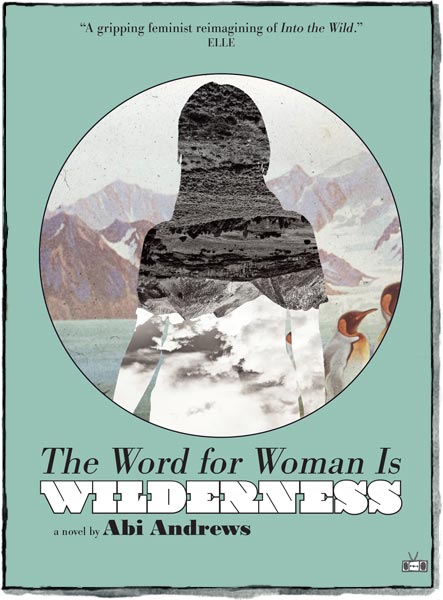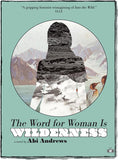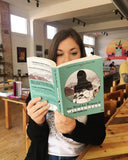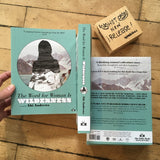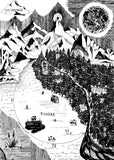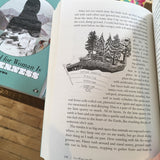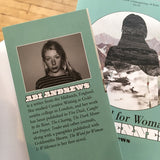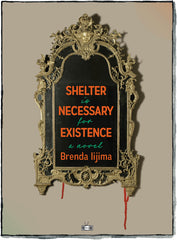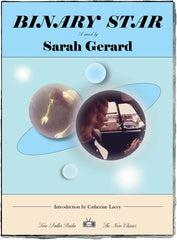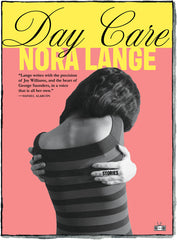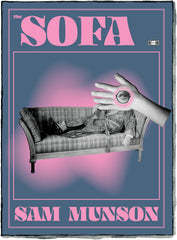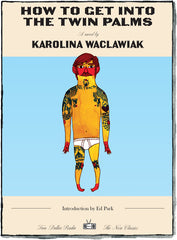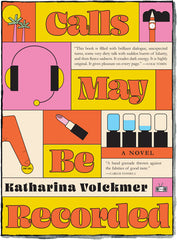The Word for Woman Is Wilderness
a novel by
Abi Andrews
ABOUT
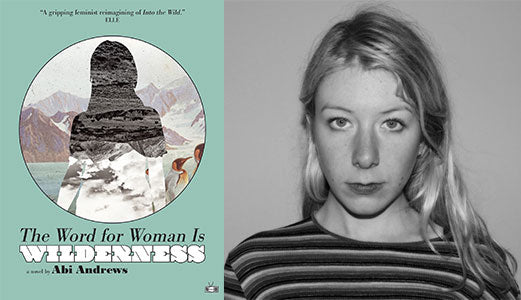
"Beguiling, audacious... rises to its own challenges in engaging intellectually as well as wholeheartedly with its questions about gender, genre and the concept of wilderness. The novel displays wide reading, clever writing and amusing dialogue."
—Sarah Moss, The Guardian
Synopsis
This is a new kind of nature writing — one that crosses fiction with science writing and puts gender politics at the center of the landscape.
Erin, a 19-year-old girl from middle England, is traveling to Alaska on a journey that takes her through Iceland, Greenland, and across Canada. She is making a documentary about how men are allowed to express this kind of individualism and personal freedom more than women are, based on masculinist ideas of survivalism and the shunning of society: the “Mountain Man.” She plans to culminate her journey with an experiment: living in a cabin in the Alaskan wilderness, a la Thoreau, to explore it from a feminist perspective.
The book is a fictional time capsule curated by Erin, comprising of personal narrative, fact, anecdote, images and maps, on subjects as diverse as The Golden Records, Voyager 1, the moon landings, the appropriation of Native land and culture, Rachel Carson, The Order of The Dolphin, The Doomsday Clock, Ted Kaczynski, Valentina Tereshkova, Jack London, Thoreau, Darwin, Nuclear war, The Letters of Last Resort and the pill, amongst many other topics.
The Word for Woman Is Wilderness is bold and inventive, both adventure story and statement, that introduces a fierce new talent in Abi Andrews.
Read an excerpt of the novel here:
Lit Hub, March 15, 2019, from The Word for Woman Is Wilderness
Reviews
Scroll to bottom for Goodreads reviews.
"This deeply feminist adventure tale is a splendid, innovative response to the genre of masculine travelogue."
—Publishers Weekly, Starred Review
(Read the full review of The Word for Woman Is Wilderness)
"A philosophy book at heart... charming, and funny, and smart... I absolutely loved this book."
—Liberty Hardy, All the Books! Podcast (Ep 200), BookRiot
"A great read: through the adventures of her protagonist Erin, Andrews challenges the traditional patriarchal narratives of adventure, exploration, and constructs of 'wilderness' in a story that is equal parts witty, charming, and deeply compelling."
—Yvonne C. Garrett, The Brooklyn Rail
(Read the full review of The Word for Woman Is Wilderness)
"A philosophical adventure novel about a 19-year-old woman who intends to travel to Alaska and live in the wilderness while filming a documentary novel. Like Into the Wild without all of the cliche. An engrossing summertime travel read that makes you consider the issues of the times we are living in."
—Jason Jefferies, Quail Ridge Books (Raleigh, North Carolina)
"Abi Andrews gives us a resilient, vulnerable, and sharp-thinking character for her debut novel, yet it’s her strong feminist voice that makes The Word for Woman Is Wilderness an absolute must read... It’s quick and smart and really just in a league of its own."
—Jaylynn Korrell, Independent Book Review
(Read the full review of The Word for Woman Is Wilderness)
"[Abi Andrews] is a really great writer. Really interesting, different kind of style... Definitely one I would recommend."
—Tyler Glauz-Todrank, Bear Pond Books in Montpelier, VT, TK with James Scott Podcast, Episode 84
"Just thirty pages into The Word for Woman Is Wilderness, I couldn't make heads or tails of it, which, in my mind, is the best thing a novel can accomplish. But maybe 'novel' isn't the best word—perhaps a globetrotting, Thoreauvian whodunnit? A bricolage of literary, feminist, and anthropological thought, gazing out the throat of the anthropocene? I've roamed this earth for a few decades and never found anyone who writes or thinks like Abi Andrews. Don't anticipate this book. Fear it. Love it."
—Spencer Ruchti, Harvard Book Store
"Erin is a captivating heroine—funny, feminist and intensely curious, she riffs on Bear Grylls, the beauty of the natural world and the contraceptive pill as she makes her way to a tiny cabin in desolate Denali. Brilliantly odd, and oddly brilliant."
—Eithne Farry, Daily Mail
(Read the full book review)
"This book is a whole new kind of nature/novel writing and so believable that some readers fail to note it is fiction. What I loved about this book was the sincerity of Erin and the realness of her foibles and strengths. A wonderful refreshing novel."
—Maeve Noonan, Northshire Bookstore (Manchester Center, Vermont)
"In The Word for Woman is Wilderness, Erin takes on not just a singular quest of self-exploration, but the entire history of science and environmentalism in doing so."
—Juliana Roth, The Adroit Journal
INTERVIEW: "ANTHROPOCENE FEMINISM: A CONVERSATION WITH ABI ANDREWS"
A "Most Anticipated Book of 2019"
—John Madera, Big Other
Big Other's Most Anticipated Small Press Books of 2019
A "Most Anticipated Book of 2019"
—Chris Bookish Cauldron via YouTube
"Andrews’ debut, dotted with true stories of trailblazing women (such as those enrolled on Nasa’s first female astronaut fitness programme), contains razor-sharp insights and poetic passages, and will hook those interested in the whole idea of wilderness and self-discovery."
—Charlie Brinkhurst-Cuff, The Guardian
(Read the full book review)
"Refreshingly outward-looking in a literary culture that turns ever inward to the self, although it still has profound moments of introspection. Uplifting, with a thirsty curiosity, the writing is playful and exuberant. Riffing on feminist ideas but unlimited in scope, Andrews focuses our attention on our beautiful, doomed planet, and the astonishing things we have yet to discover."
—Ruth McKee, The Irish Times
(Read the full book review)
"The Word for Woman Is Wilderness is unlike any published work I have read, in ways that are beguiling, audacious... rises to its own challenges in engaging intellectually as well as wholeheartedly with its questions about gender, genre and the concept of wilderness. The novel displays wide reading, clever writing and amusing dialogue."
—Sarah Moss, The Guardian
(Read the full book review)
"Abi Andrews’ writing is sprawling and peripatetic, drawing many links between a variety of topics; a deliberate foil to the white Western male scientific method of separating and isolating things. It is a youthful and exuberant novel, funny and cool. But the subject matter is deadly serious. This is a philosophical rumination on what nature is in the Anthropocene, if indeed it ever existed at all. Moreover, it asks what women are in relation to not only a chauvinist globalised culture, but also a masculine interpretation of wilderness. Read this book. It is amazing."
—Michael McLoughlin, Readings
"It will make you feel as small as an ant and colossal as an ocean, will take you to the depths and heights of earth and beyond into the vastness of space. With humour, irony, wit, intellectual musing and the essential power of womanhood, it is impossible to see the world the same again after the final leaf is turned."
—Lauren Brown, Go With Me
(Read the full book review)
"The Word for Woman Is Wilderness narrates the struggle of a young woman to find a place for herself in a world that idealizes masculinity and wilderness and that puts nature and humanity in direct opposition, necessitating the destruction of one or the other."
—Emma Schneider, Full Stop
(Read the full book review)
"I plan to return to Abi Andrews’ The Word for Woman Is Wilderness again and again to satisfy my occasional longing for a life on the wild side, knowing I’m in for a laugh too."
—Peyton Miller, The Mire
(Read the full book review)
"Looking for an escape from the ever-connectedness of modern life? Venture no further than than Abi Andrews’ The Word for Woman Is Wilderness. But don’t be fooled, the Midlands England native, Ms. Andrews’ debut novel is more than just an escape; it’s part travel writing, nature documentary, political gender exploration… but above all, it is an adventure. The story spans thousands of miles and dozens of issues—confronting everything from gender roles in Iceland to fighting bears in Denali National Park, Alaska. Pick up a copy to tag along with protagonist, Erin, a 19-year-old from suburban England, as she smashes stereotypes and seethes sarcasm... Read on to learn about Ms. Andrews writing process, relationship with her characters, and plans for future adventures."
INTERVIEW: Peyton Miller speaks with Abi Andrews for The Mire (May 2019)
"This gorgeously written debut will have you longing for adventure; it’s full of wonder at the natural world, as well as musings on everything from the moon landings, loneliness, nuclear war and the pill."
—Dusty Baxter-Wright, Cosmopolitan Middle East
(View the full review)
"This is not reconciliatory prose. It doesn't seek to please. It's not asking for your acceptance or the benediction of this review. It is far stronger than that. It is a quiet, sardonic, funny, fluid text, a visionary book, that shows us the future is in fact already here."
—Nick Hayes, Caught by the River
(Read the full book review)
"A gripping feminist reimagining of Into the Wild."
—Elle (Elle UK, February 2018)
"A thinking woman's adventure story... [Andrews' prose has] grace and reflection... beautiful, thoughtful, and often humorous."
—Lucy Scholes, The National
(Read the full book review)
"The many-colored themes and ideas in the book are themselves painted on complex and overlapping canvases—of feminism, in an age of wilderness, but a wilderness that has been warped as it becomes embedded in the Anthropocene."
—Elizabeth Wainwright, The Ecologist
(Read the full book review)
"A good book is one that makes you think about your own life. A great book is one that challenges your thinking. But it is a truly remarkable book that changes how you think, and The Word for Woman Is Wilderness had that effect on me. I can’t give it higher praise than that."
—Jim Dempsey, Bookmunch
(Read the full book review)
"Andrews brings a wide-ranging intellect to the page... she does well to highlight the moral contradictions that attach themselves to a modern-day traveller, keen to behave ethically in a compromised world."
—Josie Mitchell, The White Review
(Read the full book review)
"[The Word for Woman Is Wilderness] provides a fresh take on the adventure novel genre as a whole."
—Amber Williams, Her Campus
"Make room, Jack London! Andrews’s debut novel... balances a feminist corrective to the wilderness mythology."
—Addie Hopes, Edge Effects (University of Wisconsin–Madison)
"[The Word for Woman Is Wilderness] is immersive, thought-provoking, and a unique reading experience."
—Jenny Colvin, Reading Envy
(Read the full book review)
"[Delivers] a fierce love for the wilderness and a call to subvert systematic gender marginalization."
—Elisabeth Woronzoff, PopMatters
(Read the full book review)
"Refreshing and funny and unlike anything else. I feel as if I've been waiting for this book for a long time."
—Daisy Johnson, author of Sisters (2020) Everything Under (2018) and Fen (2016)
"A thought-provoking read... A book that made me daydream and will stay with me for a long time."
—Lipsy Lost & Found blog
"Erin’s voice not only conveys her intelligence, but also the immense talent of the writer herself. Abi Andrews writes from her mid-twenties with the voice of someone far beyond of her years."
—Hannah M Smith, Department of Information Studies blog, University College London
"Clever, funny and thoughtful."
—Will Ashon, author of Strange Labyrinth, Chamber Music, and The Passengers
Author

Abi Andrews is a writer from the Midlands, England. She studied Creative Writing at Goldsmiths college in London, and her work has been published in Five Dials, Caught by the River, The Clearing, The Dark Mountain Project, Tender and other journals, along with a pamphlet published with Goldsmiths Shorts. Her debut novel The Word for Woman Is Wilderness was originally published by Serpent’s Tail in February 2018 and Hoffmann und Campe in October 2018.
Sneak Peek
Enjoy a sneak peek of select pages from The Word for Woman Is Wilderness! (Use the “full screen” option at bottom right to enlarge the pages):
info
FORMAT: Paperback (Gatefold on 1st edition only)
LIST PRICE: $17.95
PAGES: 284
PRINT ISBN: 9781937512798
DIGITAL ISBN: 9781937512804
RELEASE DATE: 3/19/2019
SIZE: 5.5" x 7.5"
Guide
Click here to view and/or download as PDF.
Book Club and Reader Guide: Questions and Topics for Discussion
1. Erin sets out to deconstruct the trope of the ‘Mountain Man.’ Who is Mountain Man? What are the character traits of a Mountain Man? Can you think of any Mountain Men, in literature or in popular culture?
2. Initially, Erin intends to emulate the Mountain Man. But over the course of her journey, Mountain Man becomes a more problematic figure for Erin. What do you think Erin finds difficult about the glorification of Mountain Men?
3. Erin sees her trip as a feminist quest. She is claiming her right to the freedom of white men. However, this freedom starts to sit uneasily with her as she encounters other women who cannot claim it like she can. On the Highway of Tears she wonders if her experience could ever be comparable to that of the many native women who have been murdered on the very highway that enables her adventure. How does Erin’s quest relate to the questions of intersectionality in feminism?
4. ‘Millenial’ is often used pejoratively to describe Erin’s generation of Internet literate young people. Erin’s voice is playfully kaleidoscopic, paradoxical, sardonic, roping in high and low culture, making a mosaic of the ideas of others — it could be said that her voice is distinctly millenial. Do you think the voice of Erin shows a lazy misuse of grammar and language conventions, or do you think it does something more? In what ways do you think it could be said that the language itself is intersectional?
5. Erin finds identification with the plight of whales and dolphins; she says ‘cetaceans are women’s allies in the war against patriarchy because patriarchy holds the cetaceans down with us.’ What do you think she means by this? Do you think patriarchy might affect our relations to nonhumans, and if so, how?
6. At the same time Erin is troubled the reduction of women to their biological functions, and worries about reaffirming myths that allow patriarchy to oppress, own, and plunder both women and nature. Does Erin fall back into trap of reducing women to nature, or does she overcome this by opening out a space where there is no ‘nature’ & ‘human,’ but a queering of these old dichotomies?
7. Erin’s trip is framed by danger. But the dangers that chafe against Erin mostly come from strange and familiar men. Do you think Erin is right to put herself in danger? Is she naive? How does Erin’s trip relate to the problematic narrative of women ‘asking for it,’ of ‘victim blaming’?
8. ‘Solastalgia’ is the feeling of distress caused by environmental degradation. Have you ever felt solastalgia? Do you think global climate catastrophe significantly affects individual’s mental health, or do you think Erin is lucky that this malaise is the worst of her worries?
9. Erin becomes critical of the colonial powers at play in map-making, documenting, and time-capsulizing; she sees the Voyagers as a corrupting ejaculation into the wilderness of space. Damon represents the opposite — absolute negation of the self, but he chose the extreme of suicide. Perhaps Erin finds a place between negation and propagation; she destroys the documentary, but she keeps mementos of her trip for her own recollection. Why do you think she decides to get rid of the documentary but keep some record of the trip for herself?
10. Ultimately, Erin leaves the cabin happy to return home. Is shrugging off individualism and deciding to return to society a failure, or has she learned something more important than the Mountain Men tried to keep from her all along? Is she really leaving, if she takes something of the place with her in memory?

